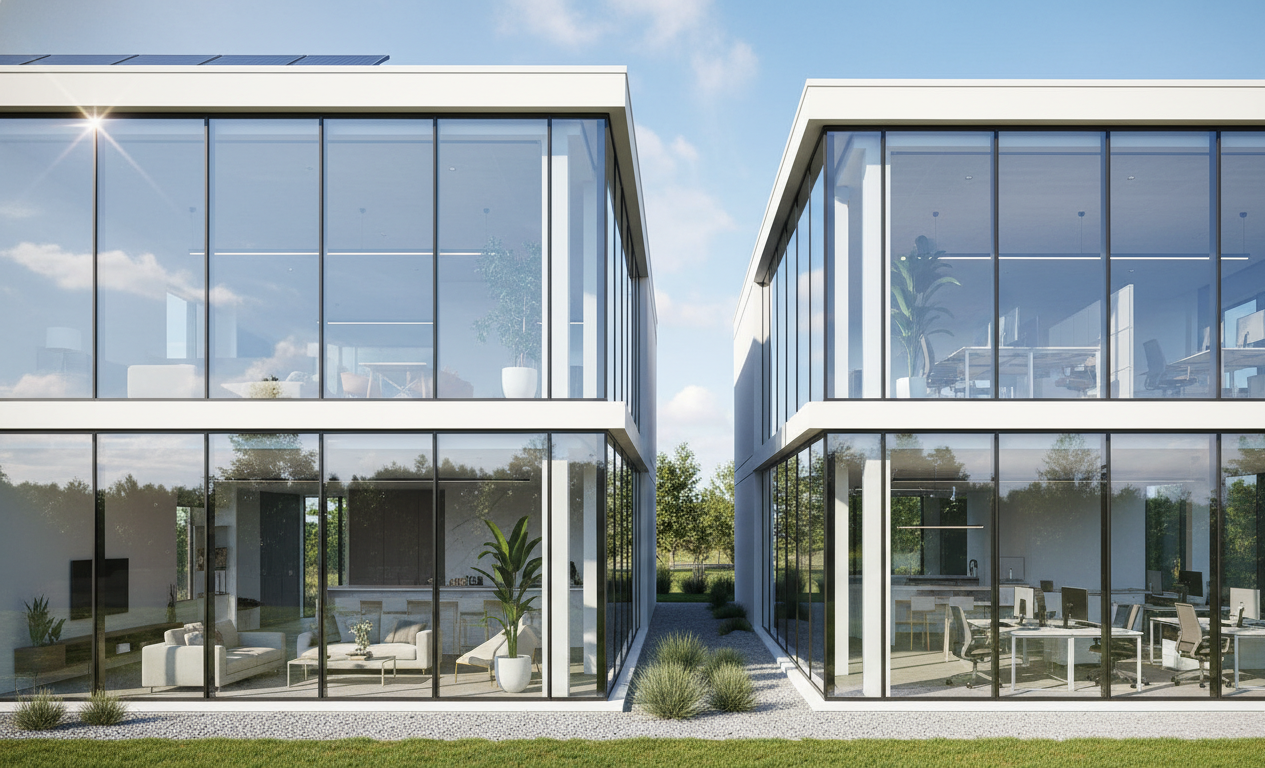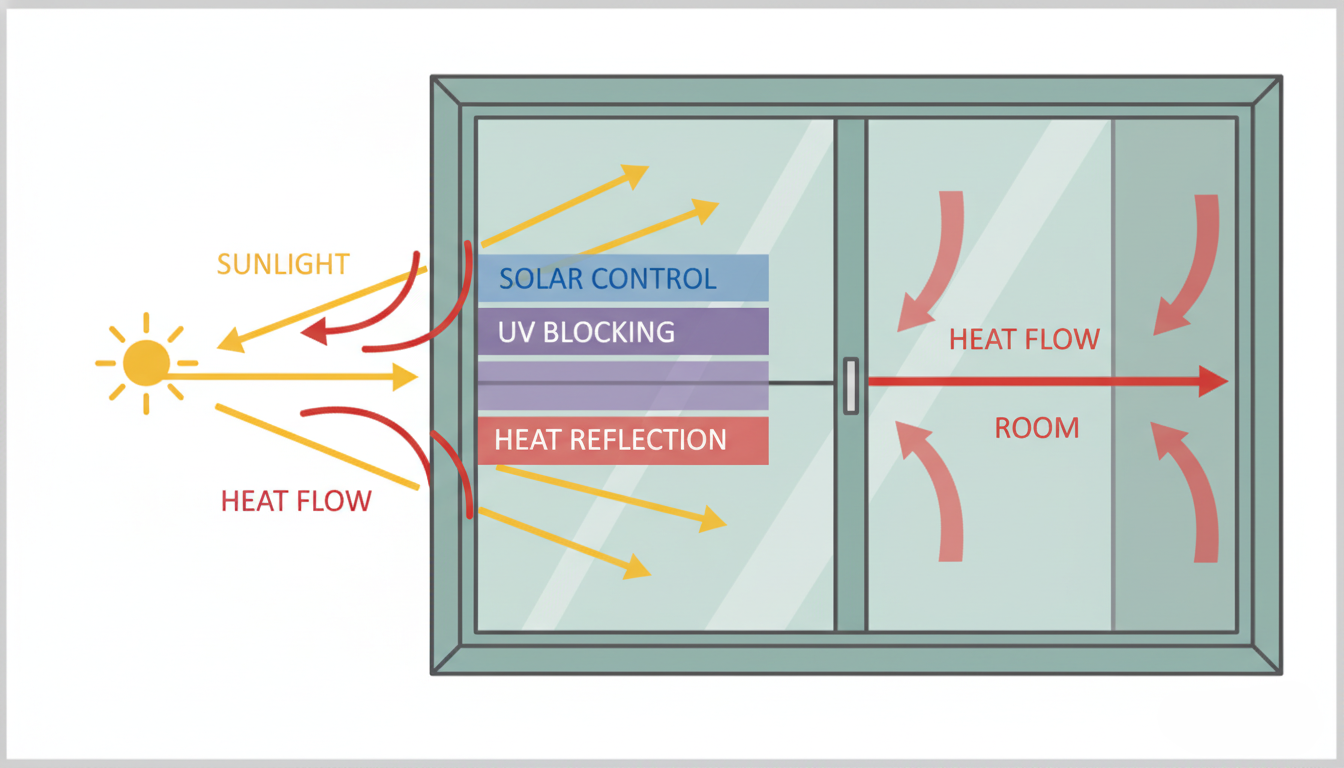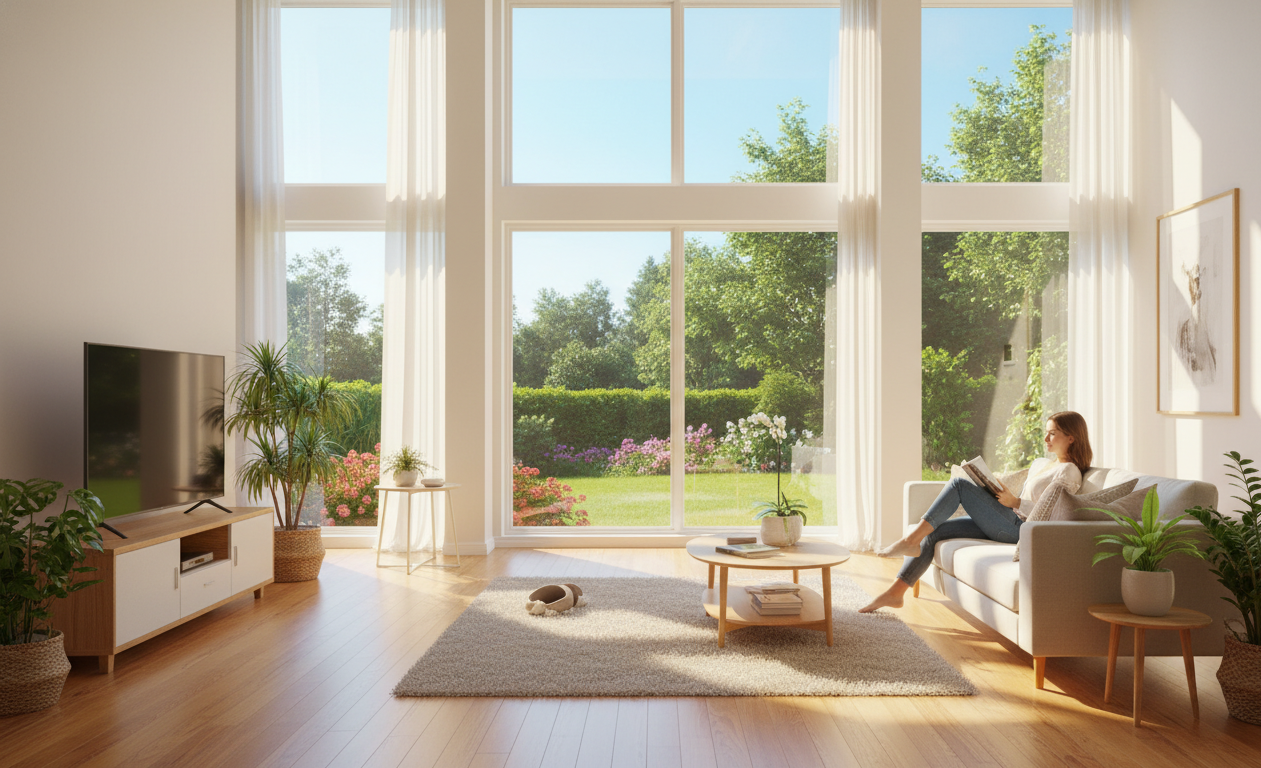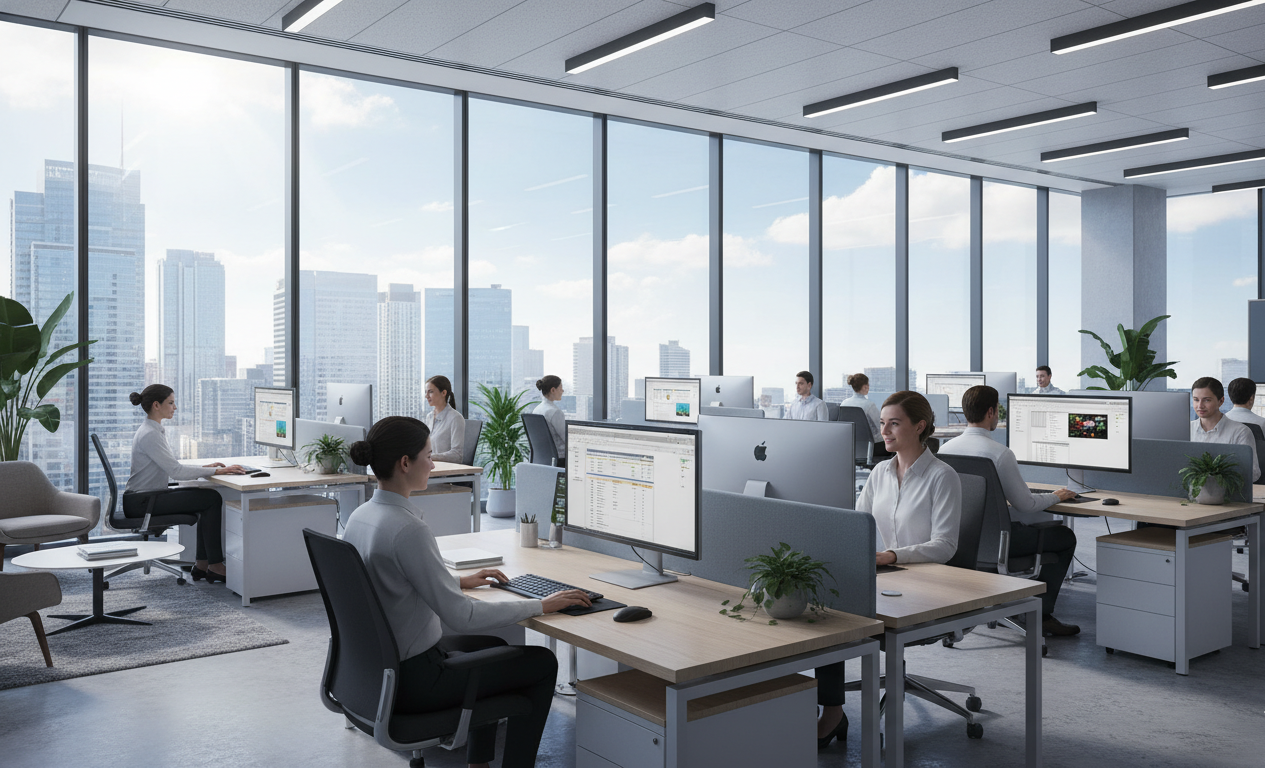
Energy costs continue to rise every year. Homeowners and business owners are looking for affordable ways to control indoor temperatures without overusing air conditioning.
Window films have become one of the simplest upgrades for improving energy efficiency. They help block heat, reduce glare, and keep spaces more comfortable in every season.
Unlike replacing windows, installing high-quality films is quick and cost-effective. They lower electricity use while maintaining clear, bright interiors.
Whether for a home, office, or commercial building, window films can make a visible difference in comfort and savings.
This article explains how residential and commercial window films improve energy efficiency and comfort, and why they are an ideal choice for modern buildings.
For both homes and commercial buildings, 3M offers window films that can significantly improve energy efficiency and indoor comfort. The 3M Sun Control Window Film Ceramic Architectural Series uses nano-ceramic technology to reject solar heat and block UV rays while preserving natural light, making it ideal for living spaces, offices or storefronts facing direct sun.
The 3M Sun Control Window Film Prestige Series employs multilayer spectrally selective technology to reduce heat gain without darkening interiors a good choice for large windows and glass facades in offices or commercial buildings.
For a full-year comfort boost, 3M All Season (Low-E) Window Film helps regulate indoor temperature by reducing heat gain in summer and limiting heat loss in cooler weather, lowering energy bills and reducing HVAC strain.
These 3M films offer a practical way to make existing windows more energy-efficient and comfortable without replacing glass.
Understand the science behind window films and how they control heat, light, and UV rays.

Window films are made of thin, multi-layered materials that are applied directly to glass surfaces. Each layer helps control how sunlight and heat pass through the glass.
These films stabilize indoor temperatures by reflecting and absorbing solar energy. They keep spaces cooler in summer and warmer in winter without changing how the window looks.
Solar control films reduce heat gain inside buildings by limiting infrared radiation. This helps prevent rooms from overheating during hot months.
They also block up to 99 percent of ultraviolet rays, protecting floors, furniture, and fabrics from fading. The result is a more comfortable and longer-lasting interior environment.
By limiting heat transfer, window films reduce the workload on HVAC systems. This lowers energy use and cuts monthly utility costs.
Studies show that properly installed window films can reduce cooling expenses by 10 to 30 percent, depending on climate and glass type.
Discover how residential window films cut energy costs and improve comfort.

Residential window films help control sunlight and heat throughout the day. They reduce glare on screens and reflective surfaces, making rooms more comfortable and easier on the eyes.
By blocking excessive solar heat, these films keep interiors cooler without relying heavily on air conditioning. Homes stay bright and pleasant while using less energy.
Insulating and low-e window films improve how well a home retains heat in winter and reflects it in summer. This helps lower electricity use year-round.
Many homeowners notice a reduction in energy bills within the first few months of installation. The savings add up while comfort levels stay high.
Window films help maintain consistent room temperatures across different areas of the house. No more hot spots near sunny windows or cold corners during cooler days.
They also protect furnishings and flooring from UV damage, preserving color and quality for years.
Explore how businesses enhance efficiency and employee comfort with solar control films.

Commercial buildings often have large glass areas that let in too much heat. Solar control window films help manage this by filtering sunlight and reducing infrared energy.
This lowers the cooling load on HVAC systems and helps maintain stable indoor temperatures. The result is improved comfort for occupants and lower operational costs for building owners.
Temperature consistency plays a big role in employee performance. Window films keep work areas cooler and minimize glare on screens, creating a more comfortable workspace.
When employees feel comfortable, they stay more focused and productive throughout the day. It’s a simple improvement that leads to measurable benefits.
Window films deliver strong financial returns over time. Reduced energy use and smaller maintenance demands translate into lasting savings.
Many businesses also gain sustainability recognition, such as LEED credits, for improving building efficiency through window film installation.
Learn the differences in performance, purpose, and film types.
Residential and commercial window films are built for different needs. Home films are often thinner and designed to keep interiors bright while controlling heat and UV rays.
Commercial films are usually thicker and more reflective. They handle higher solar loads and larger window surfaces found in office buildings and retail spaces.
Homeowners prefer clear or lightly tinted films that preserve outdoor views. They want comfort and protection without darkening their rooms.
Businesses often choose reflective or tinted films that reduce glare, improve privacy, and enhance the exterior appearance of large glass façades.
Both options improve comfort and energy efficiency but serve different design and performance goals.
Find the best film for your property based on your needs and climate.
Selecting the right window film depends on several factors. The type of glass, window direction, and amount of sunlight the space receives all matter.
Homes in hot regions may benefit from high heat-rejection films, while cooler climates may need insulating or low-e films. A professional assessment helps identify which film performs best for your location and goals.
Working with a certified installer ensures proper application and lasting results. This step also helps preserve any existing window warranties.
Solar control films reduce heat gain and glare. They are ideal for sunny spaces and south-facing windows.
Low-e films add insulation, keeping indoor temperatures steady year-round. Insulating films balance comfort by reflecting heat away in summer and retaining warmth in winter.
Each type serves a unique purpose and can be tailored for both homes and commercial buildings.
Learn about expert installation, easy upkeep, and long-term returns.
Professional installation ensures the film bonds correctly to the glass and performs as designed. Experts use specialized tools to prevent air bubbles, peeling, or uneven surfaces.
A trained installer also knows which film type works best for your windows. This guarantees lasting performance, improved energy savings, and a clean, polished finish.
Window films require very little upkeep once installed. Clean them with a soft cloth and mild, ammonia-free cleaner to avoid scratches.
Avoid using sharp tools or rough materials when wiping the surface. With simple care, films can stay clear and functional for many years.
Most high-quality window films last 10 to 20 years, depending on exposure and film type. Some even come with lifetime warranties for residential use.
Choosing certified products ensures coverage for peeling, cracking, or discoloration, giving peace of mind and reliable performance.
Energy savings often offset installation costs within two to five years. Reduced air conditioning demand and lower utility bills create long-term financial value.
Comfort, reduced glare, and improved aesthetics add indirect benefits that enhance both living and working spaces.
Understand how window films support sustainability and green building efforts.
Window films help lower a building’s carbon footprint by reducing the need for heating and cooling. Less energy use means fewer emissions from power generation.
This small upgrade can make a measurable difference in long-term sustainability, especially for large buildings and offices that rely heavily on HVAC systems.
Installing window films can help buildings qualify for energy efficiency programs like LEED or ENERGY STAR. These certifications reward projects that reduce energy consumption and promote eco-friendly materials.
By improving insulation and reducing solar gain, window films support green building goals without expensive structural changes. They’re an easy step toward more sustainable living and working environments.
Clear up common misconceptions about light loss and window damage.
Modern window films are designed to maintain brightness while reducing heat and glare. They let in natural light without darkening rooms or affecting outdoor views.
High-quality films balance visibility and solar control, creating comfort without sacrificing daylight.
Professional installation prevents any damage to glass and preserves its integrity. Certified films are tested for safety and compatibility with most window types.
Many manufacturers also offer warranties that protect both the film and the window, ensuring peace of mind for homeowners and businesses alike.
Get quick answers to common questions about window film performance and maintenance.
How long do window films last?
Most window films last between 10 and 20 years, depending on exposure, quality, and maintenance. High-end films may last even longer with proper care.
Can window films be removed or replaced?
Yes. Window films can be safely removed or replaced without damaging the glass. Professional installers can complete the process quickly.
Do window films affect visibility or indoor light levels?
Modern films keep interiors bright while controlling heat and glare. They reduce harsh sunlight without blocking the natural light that makes rooms feel open and inviting.
Window films offer a smart and affordable way to improve energy efficiency and comfort in any space. They help control heat, reduce glare, and protect interiors without affecting natural light.
For homeowners, window films lower cooling costs and protect furniture from UV damage. For businesses, they improve comfort, reduce energy use, and support sustainability goals.
Choosing the right film and professional installation ensures long-lasting results and real savings. It’s a simple upgrade that pays off every day through lower bills and better indoor comfort.
Contact American Window Film to explore the best energy-saving window films for your home or business and start improving your comfort today.
These Stories on Solar Window Film
Solar window film reduces heat, lowers energy use, and improves comfort in buildings. Learn how it works with this guide from American Window Film.
Read this postLearn how effective solar window film is for reducing heat, saving energy, and protecting interiors with American Window Film experts.
Read this postControl heat and glare with solar window film for homes. Save energy and protect interiors with American Window Film’s expert installation.
Read this postCorporate Location: 23042 Mill Creek Drive, Laguna Hills, CA 92653
Copyright 2025 - American Window Film | All Rights Reserved | Contractor's License #1054307
No Comments Yet
Let us know what you think